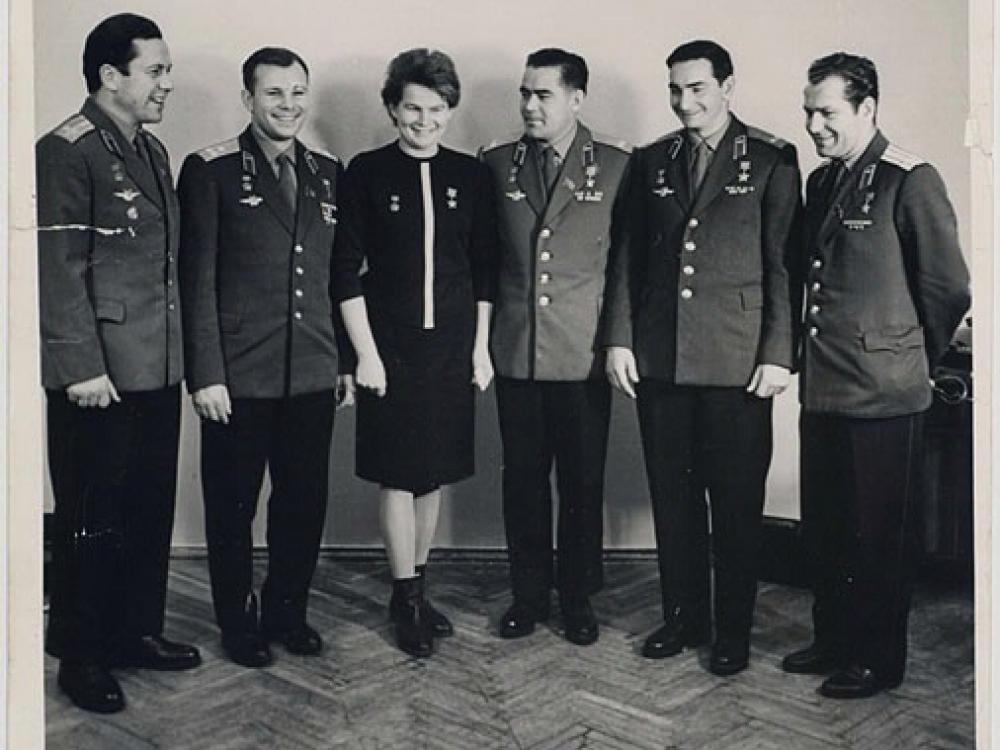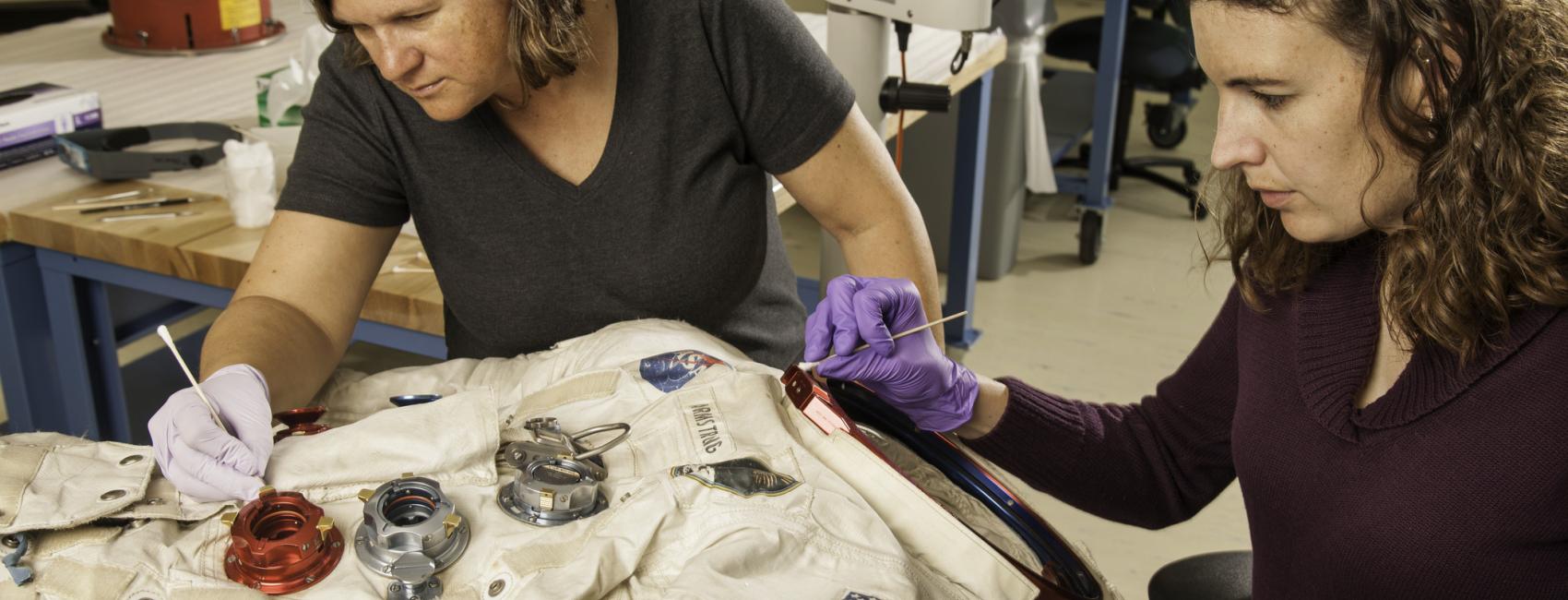
Mar 06, 2015
By Cathleen Lewis
Happy birthday Valentina Tereshkova! March 6 marks the birthday of the world’s first woman to fly in space.
On June 16, 1963, Tereshkova became the first woman to orbit the Earth for two days inside her Vostok 6 spacecraft—a similar spacecraft to the one that carried Yuri Gagarin into space. She had been selected from among five finalists. Their names, Tatyana Kuznetsova, Irina Solovyova, Zhanna Yorkina, and Valentina Ponomaryova, remain obscure to all but the most acute observers of the Soviet human spaceflight program. Tereshkov trained with these women for a little over a year before her flight in 1963 and into the 1970s until the hope of sending an all-woman, multi-person crew to orbit the Earth was abandoned. The Vostok 6 flight was a co-orbiting flight with Soviet cosmonaut Valery Bykovsky and his Vostok 5 spacecraft. Tereshkova's flight remains controversial in some Russian circles as engineers at the time complained that she had not properly executed her assignments in flight. In the United States, her flight was controversial because a Soviet woman flew in space at a time when women were not even considered to take part in the astronaut program. Five months after her flight, Valentina Tereshkova married a fellow cosmonaut, Andrian Nikolayev—they separated and divorced soon after the birth of their daughter, Elena. Tereshkova went on to assume political and diplomatic roles throughout her career. Even today she makes occasional appearances throughout the world as one of the last two surviving Vostok cosmonauts. This birthday is especially significant for Valentina Tereshkova. For the first time in almost 17 years, there is another Russian woman in space. It might seem odd to some that the country that led by launching the first woman in space has fallen so far behind the United States. To date, the U.S. has sent 43 women into space. Twelve women have represented other nations through either single or dual citizenship, including two women "Taikonauts" from China. Only four Russian or Soviet women have flown in space. What happened to the promise of equal opportunity in space for Russian women?
Valentina Tershkova's flight in 1963 was initially one of opportunity. Unlike her male counterparts, Tereshkova was not selected based on her flying skills; she had thrived at parachute training but had never operated an aircraft before her selection. Only one of her colleagues in the women's brigade was an accomplished pilot and possessed a degree in Aeronautical Engineering. None of the Soviet women pilots from World War II, who were known as "Night Witches," had been included in the ad hoc recruitment. After the group was disbanded, there was no thought of reconstituting a women's brigade or of recruiting women for the regular cosmonaut program. This was until NASA announced the "Astronaut Group 8" in 1978; the first class of astronauts selected exclusively for the Space Shuttle program. Among them were six women, three black men, and one Asian man. As an almost knee-jerk response, Soviet space planners plucked Svetlana Savitskaya from a career as an aerobatic sports pilot and sent her to the Salyut 7 Soviet space station after two years of training. Almost a year before Sally Ride became the first American woman in space aboard the Space Shuttle Challenger, Savitskaya became the second Soviet woman in space. Two years later, Savitskaya returned to space, this time to perform a spacewalk three months before Kathryn Sullivan's announced spacewalk on board the shuttle. In the years after Savitskaya's spacewalk, there was some lip service paid to recruiting female cosmonauts to the Soviet program, but none flew again for a decade. Finally, Elena Kondakova made a five-month stay on board the space station Mir in 1994-5. Kondakova continued her spaceflight career when she flew on board the space shuttle in 1997 as part of US-Russian cooperative planning for building the International Space Station (ISS). The last 17 years have witnessed a reorganization of the Russian space program. Funding has declined, the Russians no longer have their own space station, and Russian Soyuz rockets now carry crews exclusively to the ISS. During this time there have been a few Russian women cosmonaut candidates—perhaps one in every other entering class—but none had actually made it to space in almost 17 years. The one successful candidate was Elena Serova, who was in the selection class of 2006. She made her first spaceflight in September 2014, flying in the Soyuz TMA 14M to become a part of Expedition 41 on board the ISS. She remains in orbit today, planning for a return to Earth later this month. The significance of Serova's flight, returning Russian women to orbit, was not lost on Russian television audiences. At the opening ceremonies of the Sochi Winter Olympics in 2012, Tereshkova and Serova joined together to represent the past and present of women cosmonauts in the Russian and Soviet space programs. This picture shows them together at the Cosmonaut Training Center in Star City near Moscow. However, this photograph might be a fleeting image of the progress that Russian women are making in the cosmonaut corps. The Russian cosmonaut class of 2014 has only one woman, Anna Kikina.
At the Gagarin Cosmonaut Training Center in Star City, Russia, Expedition 41/42 Flight Engineer Elena Serova of the Russian Federal Space Agency (Roscosmos) enjoys the spotlight with the first woman to fly in space, Russian icon Valentina Tereshkova, during the Expedition crew's departure activities September 12, prior to flying to their launch site at the Baikonur Cosmodrome in Kazakhstan for final prelaunch training.
I anticipate that Elena Serova will join us all in wishing Tereshkova a happy birthday. Perhaps there will no longer be a decade-long break between her return to Earth later this month and the next Russian woman cosmonaut. In the meantime, we’re happy to celebrate the birth of the first woman in space. Here is to you Valentina! We all hope that there will be more Russian women to continue your legacy in the near future.

We rely on the generous support of donors, sponsors, members, and other benefactors to share the history and impact of aviation and spaceflight, educate the public, and inspire future generations. With your help, we can continue to preserve and safeguard the world’s most comprehensive collection of artifacts representing the great achievements of flight and space exploration.
We rely on the generous support of donors, sponsors, members, and other benefactors to share the history and impact of aviation and spaceflight, educate the public, and inspire future generations. With your help, we can continue to preserve and safeguard the world’s most comprehensive collection of artifacts representing the great achievements of flight and space exploration.